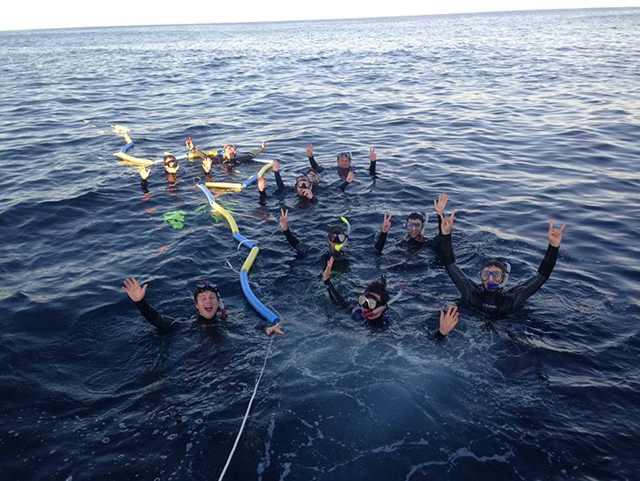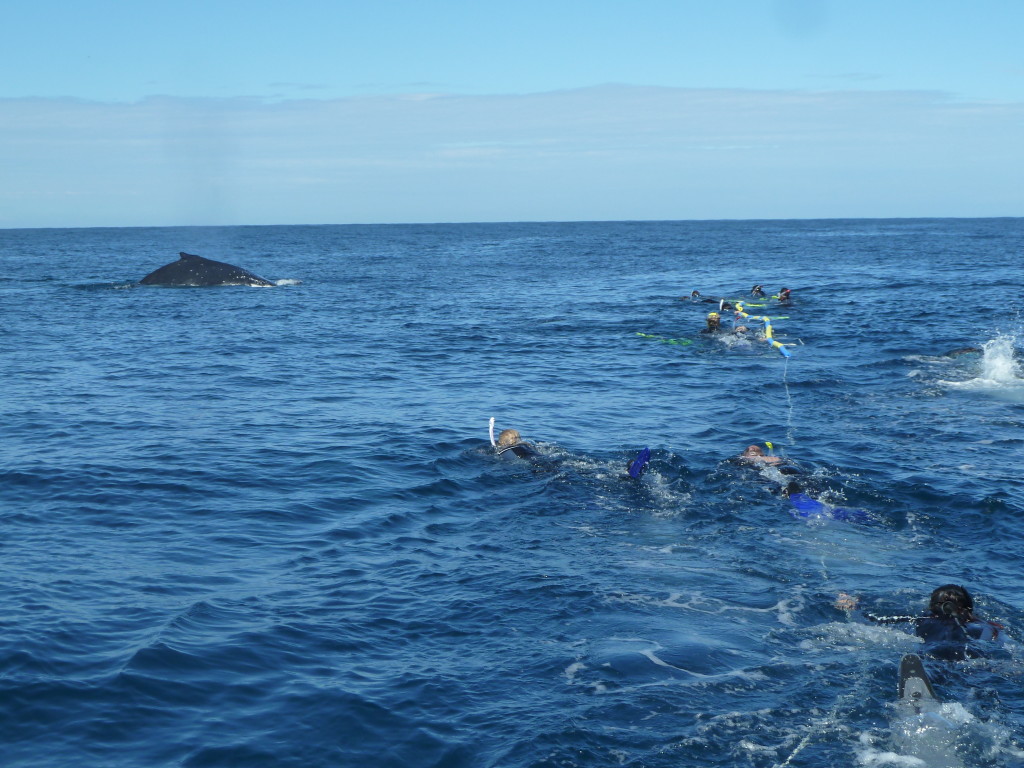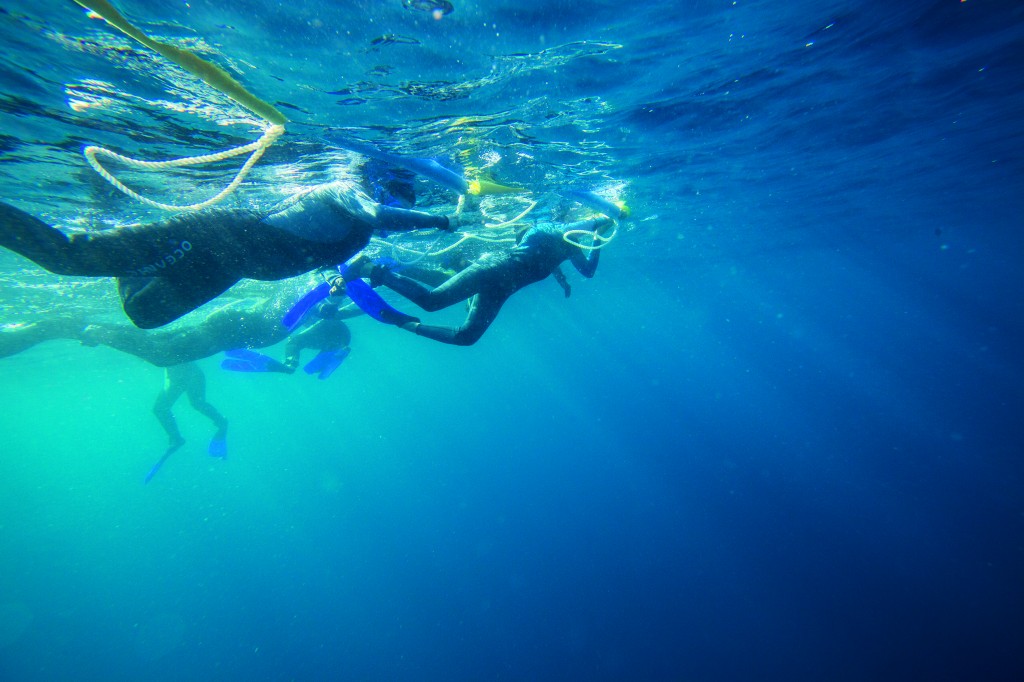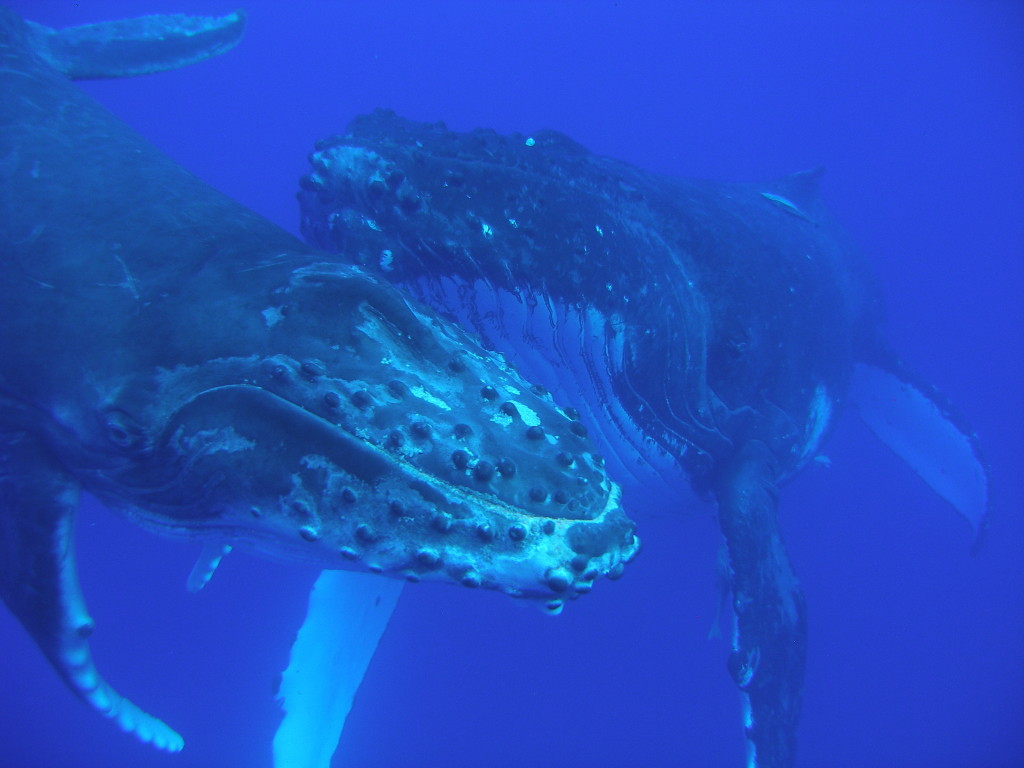Marine Life & Conservation
Sunreef Mooloolaba Gets Set For 2015 Swimming With Whales Season

As the humpback whales in the Antarctic are feeding and increasing their blubber stores ready for their annual migration up the Australian east coast, the Sunreef Mooloolaba crew are also gearing up for another Swim with Whales season on Queensland’s beautiful Sunshine Coast.
After launching Australia’s first Swimming with Humpback Whale encounters in 2014, Sunreef are keen to help more people experience an encounter with these magnificent mammals from a new perspective.
Sunreef Whale Encounter Supervisor Dan Hart said more than 2,000 people from all over the world experienced their Swim with Whales tours in 2014.
“This year we are expecting even greater demand, with lots of people already booking the immersive experience.
“In addition to our three-hour experiences, this year we are also launching new full-day tours in collaboration with Australia Zoo aboard their custom-built conservation and research vessel, Croc One.
“Like our three-hour tours, there will be a maximum of twenty people per tour. The full day tours will allow more time for whale interactions and include a lovely lunch as well.”

This year more than 22,000 humpbacks are expected to make the migration north from Antarctica starting in about March, arriving in Queensland by July and returning south from September to November. After eating up to four ton of krill and small fish a day each in the Antarctic over summer, the Humpbacks migrate to the warmer northern waters which provide perfect temperatures to give birth to their calves in the sheltered waters of Queensland’s coastline.
“Its so exciting to know, as we work to prepare for their arrival and talk with whale researchers about the studies they will conduct this year, that the whales are preparing too, feeding and fattening themselves up ready for their travels.
“I just can’t wait to get in the water with them again. It’s such a unique experience that every time it’s just like my first all over again. It’s almost indescribable but it gives you a rare insight into their world – it gives me goose bumps just thinking about it.
“I also love seeing and hearing everyone’s reactions when we have a great encounter. We see the whales from the surface and then you will hear the swimmers squealing excitedly through their snorkels as the whale swims past – its just takes your breath away every time!”

Dan said the swimming with whales experience was operated under a strict Code of Conduct to protect both the whales and the participants.
Participants who take part in a Swim with Humpback Whales experience can expect a three-hour or day-long round trip with a maximum of 20 participants on each trip.
Dan said Sunreef provide a full briefing on what to expect and safety procedures as well as providing all required equipment.
“Once a whale is sighted, the boat will be put into neutral 100m or more away from the whale, and if the conditions are determined safe by our trained crew, the boat will be turned off and swimmers will be allowed into the water holding on to the floating line attached to the boat.
“Then it’s all up to the whale – it is a natural experience and it is 100% on the whale’s own terms,” Dan said.
“In our experience, the whales seem as intrigued by us as we are of by them and often come close to swimmers, gliding effortlessly around us, with such a gentleness that its like they recognise our fragility in comparison and know we are there out of wonder and respect,” Dan said.

It takes about 15 minutes from the Sunreef dock to get out to the beautiful waters off Mooloolaba which are at their best during the winter months when the whales migrate. Water temperatures during this time range from 17 to 23 degrees C and visibility is regularly up to 30 metres.
The 2015 Sunreef Swim with Whales season will start on July 4th and run through until the end of October.
Sunreef Mooloolaba, based in Queensland’s Sunshine Coast, is the longest established dive centre on the Sunshine Coast (Queensland, Australia) with roots starting back in 1976.
Sunreef is a 5 Star PADI Training Centre and offers accredited dive courses for all levels of divers as well as local reef dives, snorkelling trips and diving on the ex-HMAS Brisbane. Sunreef also plans and guides international dive trips and travel as well as dive equipment sales and servicing.
The whale swimming and watching operations work out of Mooloolaba in the heart of Queensland’s beautiful Sunshine Coast.
Here’s a video preview for the 2015 season:
[youtube id=”ZN7luTbTtlA” width=”100%” height=”400px”]
For more information on Sunreef and swimming with the whales visit www.sunreef.com.au or call +61 (0)7 5444 5656.
Marine Life & Conservation
Leading UK-based shark conservation charity, the Shark Trust, is delighted to announce tour operator Diverse Travel as a Corporate Patron

 Corporate Patrons provide a valuable boost to the work of The Shark Trust. The Trust team works globally to safeguard the future of sharks, and their close cousins, the skates and rays, engaging with a global network of scientists, policymakers, conservation professionals, businesses and supporters to further shark conservation.
Corporate Patrons provide a valuable boost to the work of The Shark Trust. The Trust team works globally to safeguard the future of sharks, and their close cousins, the skates and rays, engaging with a global network of scientists, policymakers, conservation professionals, businesses and supporters to further shark conservation.
Specialist tour operator Diverse Travel has operated since 2014 and is committed to offering its guests high quality, sustainable scuba diving holidays worldwide. Working together with the Shark Trust will enable both organisations to widen engagement and encourage divers and snorkellers to actively get involved in shark conservation.
“Sharks are truly at the heart of every diver and at Diverse Travel, we absolutely share that passion. There is nothing like seeing a shark in the wild – it’s a moment that stays with you forever!” says Holly Bredin, Sales & Marketing Manager, Diverse Travel.
“We’re delighted to celebrate our 10th year of business by becoming a Corporate Patron of the Shark Trust. This is an exciting partnership for Diverse and our guests. We will be donating on behalf of every person who books a holiday with us to contribute towards their vital shark conservation initiatives around the world. We will also be working together with the Trust to inspire divers, snorkellers and other travellers to take an active role – at home and abroad – in citizen science projects and other activities.”
Paul Cox, CEO of The Shark Trust, said:
“It’s an exciting partnership and we’re thrilled to be working with Diverse Travel to enable more divers and travellers to get involved with sharks and shark conservation. Sharks face considerable conservation challenges but, through collaboration and collective action, we can secure a brighter future for sharks and their ocean home. This new partnership takes us one more valuable step towards that goal.”
For more information about the Shark Trust visit their website here.
For more about Diverse Travel click here.
Marine Life & Conservation
Shark Trust Asks Divers to help with Shark Sightings this Global Citizen Science Month

 Whether you are stuck for ideas of what to do with the kids or are off on the dive trip of your dreams. You can get involved in Citizen Science Month and help the Shark Trust by providing vital data about sharks are rays both close to home and further afield.
Whether you are stuck for ideas of what to do with the kids or are off on the dive trip of your dreams. You can get involved in Citizen Science Month and help the Shark Trust by providing vital data about sharks are rays both close to home and further afield.
In addition to reporting the sharks and rays you see on your dives, the eggcases you find on the beach, the Shark Trust is looking for some specific data from divers who are asked to report any Oceanic Whitetip and Basking Sharks.
Oceanic Whitetip Sharks
The Shark Trust are looking specifically for Oceanic Whitetip Shark sightings over the coming weeks and months. So, if you are diving anywhere in the world, please report your sightings via the website or app.
Website: https://recording.sharktrust.org/
App: Search The Shark Trust in your app store
The Oceanic Whitetip. Known for their incredibly long dorsal and pectoral fins, this species was once the most abundant oceanic-pelagic species of shark on the planet.
Large and stocky, they are grey or brown above, and white below and famous for their huge rounded first dorsal fin and paddle-like pectoral fins. The fins also highly prized within the shark fin trade. Whilst they are mostly solitary, Oceanic Whitetips do occasionally hunt in groups.
An inquisitive species, they were easy prey for fisheries. Combined with their low reproductive rate, they were inevitably at high risk of population depletion. And declines of up to 99% have been reported in certain sea areas. They are listed as Critically Endangered on the IUCN Redlist (2019).
Conservation efforts to discourage further declines include listing on CITES Appendix II and CMS Appendix I. They’re also the only species prohibited from take by all the Tuna RFMOs (Regional Fisheries Management Organisations). However, these measures do not mean that Oceanic Whitetips are not still caught – whether targeted or as bycatch – in some parts of the world. With populations declining at such a high rate, effective implementation of management measures is essential to ensure that the species can recover.
If you are lucky enough to get an image of an Oceanic Whitetip and you record your sighting on the Shark Trust app or website YOU CAN WIN! All images submitted with sightings, that also give consent to use in conservation messaging, will be in with a chance to win an Oceanic Whitetip T-shirt and mug. The competition will run until the end of “Shark Month” in July – so keep those sightings (and images) coming in.
Basking Sharks
Basking Shark (Cetorhinus maximus) season is upon us, and the Shark Trust is asking everyone to keep an eye out for these majestic giants over the summer months. If you see any, you can record your sighting to the Basking Shark Sightings database.
Each year, these mighty fish return to British waters to feed on plankton. You may see one, (or a few if you’re really lucky) from around April-October. They can be seen feeding at the surface of the water, where they look like they’re basking in the sun. Thus, their name!
Sighting hotspots around the British Isles include southwest England, Isle of Man, north coast of Ireland, and western Scotland. The Sea of the Hebrides is the most prolific sightings area in Scotland, but they have been spotted all around the coast and have even ventured into some of the sea lochs. The Shark Trust has received thousands of sightings since the Basking Shark project began, but more data is needed to truly understand what is going on with population numbers and distribution. You can help by recording your sightings this summer.
Great Eggcase Hunt
The Shark Trust has an Easter Egg Hunt with a difference for you to try. Take part in the Great Eggcase Hunt and get involved with a big citizen science project that helps shark, ray and skate conservation. And it’s an enjoyable activity for all the family.
The Shark Trust also want snorkellers and divers to record their underwater eggcase findings. Underwater records help pinpoint exactly where sharks and skates are laying their eggs and can help link to beach records. Learning the depth and substrate that they lay on also helps better understand the species.
Find out more: https://www.sharktrust.org/great-eggcase-hunt
Whether you are diving, snorkelling or exploring on the beach you can take part in Citizen Science Month and get actively involved in shark and ray conservation. Find out more: www.sharktrust.org
-

 News3 months ago
News3 months agoHone your underwater photography skills with Alphamarine Photography at Red Sea Diving Safari in March
-

 News2 months ago
News2 months agoCapturing Critters in Lembeh Underwater Photography Workshop 2024: Event Roundup
-

 Marine Life & Conservation Blogs2 months ago
Marine Life & Conservation Blogs2 months agoCreature Feature: Swell Sharks
-

 Blogs2 months ago
Blogs2 months agoMurex Resorts: Passport to Paradise!
-

 Blogs2 months ago
Blogs2 months agoDiver Discovering Whale Skeletons Beneath Ice Judged World’s Best Underwater Photograph
-

 Gear News3 months ago
Gear News3 months agoBare X-Mission Drysuit: Ideal for Both Technical and Recreational Divers
-

 Gear Reviews2 months ago
Gear Reviews2 months agoGear Review: Oceanic+ Dive Housing for iPhone
-

 Marine Life & Conservation2 months ago
Marine Life & Conservation2 months agoSave the Manatee Club launches brand new webcams at Silver Springs State Park, Florida









